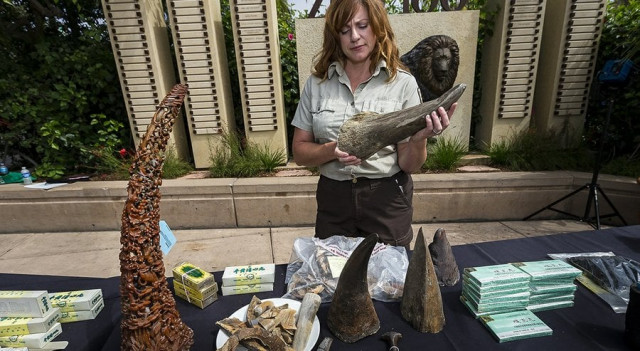San Diego zoo burns $1 mn worth of rhino horn
This will send message to criminal networks and to horn buyers that US will not tolerate illegal trade in rhino horn

Carved rhino horns and other products made from the horns are displayed at the San Diego Zoo. PHOTO: San Diego Zoo
"This rhino horn burn sends the message to criminal networks and to rhino horn buyers that the United States will not tolerate illegal trade in rhino horn," Susie Ellis, the head of the International Rhino Foundation, said in a statement.
"The high demand for this commodity results in dire consequences for rhino species. Today's burn makes clear that confiscated horns should not be stockpiled, let alone traded."
The bonfire at the California zoo, which is home to 30 rhinos, comes as other zoos and private reserves around the world are increasingly holding similar high-profile events to shed light on the crisis facing rhinos.
Rare Indian rhinos face growing threat from poachers
Rhino horns can fetch thousands of dollars in East Asia due to their supposed medicinal qualities, fueling a boom in poaching and trafficking, particularly in Zimbabwe and South Africa.
Also believed to be an aphrodisiac, the horn is composed mainly of keratin, the same component as in human nails.
Kenya and Mozambique have already destroyed most of their rhino horn stockpile and conservationists are encouraging other governments to follow suit.
"With the increasing value of rhino horn, stockpiles present a high-value target for theft," Ellis said.
"In countries with limited resources to protect stockpiles, or with concerns about corruption, destroying horns can eliminate the risk of confiscated horn from entering the black market."
Officials at the San Diego Zoo said that if the current rate of poaching continues, rhinos could become extinct within 15 years.
The San Diego stockpile came from various seizures carried out by the US Fish and Wildlife Service, officials said.
Thursday's event, the first of its kind in the United States, comes ahead of World Rhino Day on September 22.



















COMMENTS
Comments are moderated and generally will be posted if they are on-topic and not abusive.
For more information, please see our Comments FAQ